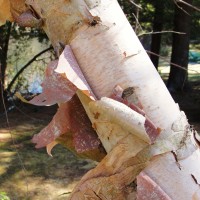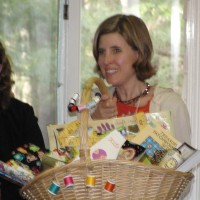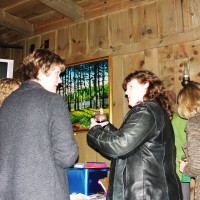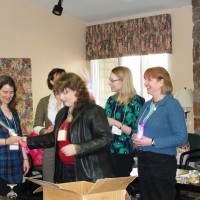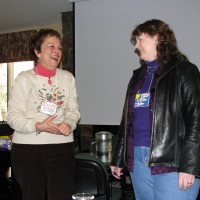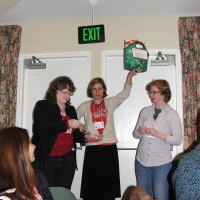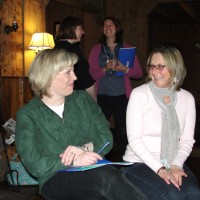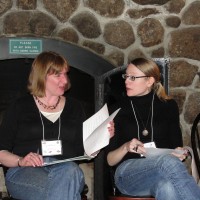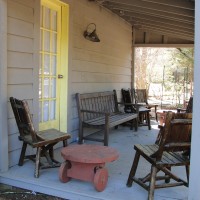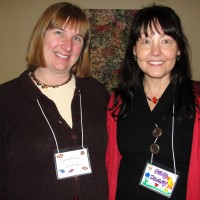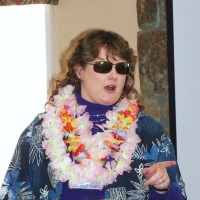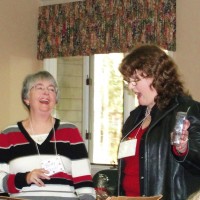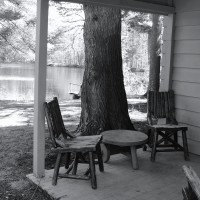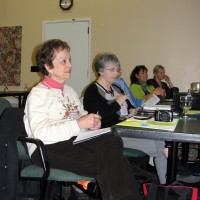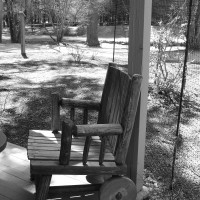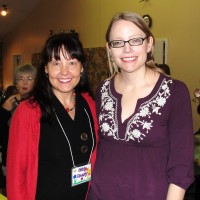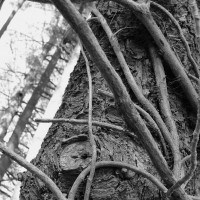 Eleven hours after leaving my father’s bedside in Chapel Hill, I am on another plane back to Washington, D. C. (my second Washington layover in twenty-four hours). With twenty minutes to make my connection to Buffalo, New York, I run the length of fifteen gates and make the flight. Nearly an hour later, we approach the Buffalo airport, passing Niagara Falls. The tremendous force of the water’s surge reminds me of my father and his determination to live, fueled by a desire that non-writers may not comprehend. My father must write, and because of this deep passion, he has lived past all the doctors’ expectations. Focused and determined, he is thankful for simple gifts: A blue sky filled with clouds. The sight of a bird on a branch outside his small window. A phone call from a family member. A smile from a caregiver. A young child’s laughter. A warm hand to hold. An extra day to live and to write; to love and to cherish. And lastly to know that his most recent illness did not keep his daughter from attending the 2011 Highlights Foundation Writers Workshop. (At the beginning of the week, all of my plans had become precarious, including my trip to Chautauqua.)
Eleven hours after leaving my father’s bedside in Chapel Hill, I am on another plane back to Washington, D. C. (my second Washington layover in twenty-four hours). With twenty minutes to make my connection to Buffalo, New York, I run the length of fifteen gates and make the flight. Nearly an hour later, we approach the Buffalo airport, passing Niagara Falls. The tremendous force of the water’s surge reminds me of my father and his determination to live, fueled by a desire that non-writers may not comprehend. My father must write, and because of this deep passion, he has lived past all the doctors’ expectations. Focused and determined, he is thankful for simple gifts: A blue sky filled with clouds. The sight of a bird on a branch outside his small window. A phone call from a family member. A smile from a caregiver. A young child’s laughter. A warm hand to hold. An extra day to live and to write; to love and to cherish. And lastly to know that his most recent illness did not keep his daughter from attending the 2011 Highlights Foundation Writers Workshop. (At the beginning of the week, all of my plans had become precarious, including my trip to Chautauqua.)

 I am here because of him, because of this man whom I love and cherish. He is my hero and my mentor, my father and friend. His needs became my only focus, when I was summoned to NC this past Monday. Prepared for the worst, I got on a plane, carrying his favorite music: Wildflowers by Judy Collins. Yet when I reached his hospital room, he was eating chocolate pudding and asking for his laptop. In what one would call a true miracle, though a temporary one, he astounded the medical staff, his family too. Knowing how short his time is, leaving him was nearly impossible, but he wanted nothing less for me. In his own loving way to force me out of his room to head for the airport, he did what he does best: he made me laugh. My father popped a red Skittle in his mouth, waved two fingers at me, and then returned to working on his current manuscript. “Don’t worry about me. Focus on your writing. I’m okay, I’m ready to ease on down the road.”
I am here because of him, because of this man whom I love and cherish. He is my hero and my mentor, my father and friend. His needs became my only focus, when I was summoned to NC this past Monday. Prepared for the worst, I got on a plane, carrying his favorite music: Wildflowers by Judy Collins. Yet when I reached his hospital room, he was eating chocolate pudding and asking for his laptop. In what one would call a true miracle, though a temporary one, he astounded the medical staff, his family too. Knowing how short his time is, leaving him was nearly impossible, but he wanted nothing less for me. In his own loving way to force me out of his room to head for the airport, he did what he does best: he made me laugh. My father popped a red Skittle in his mouth, waved two fingers at me, and then returned to working on his current manuscript. “Don’t worry about me. Focus on your writing. I’m okay, I’m ready to ease on down the road.”

 Along with his love and support, his words and his humor, he allowed me a few of his beloved trinkets: a small Pinocchio, Jiminy Cricket, and Mickey Mouse. They sit on the dresser of my hotel room, and the expressions on their faces keep me smiling and laughing and hoping.
Along with his love and support, his words and his humor, he allowed me a few of his beloved trinkets: a small Pinocchio, Jiminy Cricket, and Mickey Mouse. They sit on the dresser of my hotel room, and the expressions on their faces keep me smiling and laughing and hoping.

 At the airport, I meet up with my dear friend, Nanci Turner Stevenson, and eventually we realize (she does, at least) that we are in the wrong part of the airport. And that people have been looking for us. Reunited with one of many groups of attendees and mentors to arrive, we board a van and head for the grounds of Chautauqua.
At the airport, I meet up with my dear friend, Nanci Turner Stevenson, and eventually we realize (she does, at least) that we are in the wrong part of the airport. And that people have been looking for us. Reunited with one of many groups of attendees and mentors to arrive, we board a van and head for the grounds of Chautauqua.

 Upon our arrival at the Hall of Christ, we are greeted with smiles and hugs, handed bottles of cold water and a bag of books. Orientation is quick, and then our group of attendees disperses in search of their housing. “Just follow the red brick road,” someone says. And we do, though it doesn’t take long for me to lose my group and trail away from the red brick road, which I imagine is the yellow brick road. The surroundings steal my attention; there is too much to soak in. I am a five-year-old child again, holding a crisp one-dollar bill, in the middle of a candy shop filled to the ceiling with gumdrops and hard coffee candies and penny sticks and lollipops and saltwater taffy and sweet tarts and anything else a child’s heart might desire.
Upon our arrival at the Hall of Christ, we are greeted with smiles and hugs, handed bottles of cold water and a bag of books. Orientation is quick, and then our group of attendees disperses in search of their housing. “Just follow the red brick road,” someone says. And we do, though it doesn’t take long for me to lose my group and trail away from the red brick road, which I imagine is the yellow brick road. The surroundings steal my attention; there is too much to soak in. I am a five-year-old child again, holding a crisp one-dollar bill, in the middle of a candy shop filled to the ceiling with gumdrops and hard coffee candies and penny sticks and lollipops and saltwater taffy and sweet tarts and anything else a child’s heart might desire.

 I am no longer in Kansas or Chapel Hill or UNC Hospital or a care facility. There are no hospital beds, grey carts loaded with medicines, elderly people trying to escape, or women cradling doll babies in their arms, rocking in a chair—alone in a small room.
I am no longer in Kansas or Chapel Hill or UNC Hospital or a care facility. There are no hospital beds, grey carts loaded with medicines, elderly people trying to escape, or women cradling doll babies in their arms, rocking in a chair—alone in a small room.

 Chautauqua is, as Kathryn Erskine describes after our first dinner together as a group, Brigadoon. Sunlight dances on leaves. Chipmunks streak across the brick road. Birds sing. The bell tower chimes. Music from long ago drifts through open windows. Piano music from down a hill pulls me past yellow houses with blue shutters, white houses with wraparound porches, and colorful summer homes that remind me of the Gingerbread Cottages in Oaks Bluff on Martha’s Vineyard. Blooming flowers burst with color: blue hydrangeas, orange poppies, yellow and burgundy daylilies, echinacea, purple clematis, cosmos, lace capped hydrangeas, phlox, and impatiens. Porches welcome you with rocking chairs, swings, and hammocks. Figurines dance on the lawns with open arms. And everywhere you go there are bicycles in shades of blue, orange, red, yellow, green, black, and silver. Wicker baskets on handlebars overflow with fresh flowers, books, or fruit. Some parked bicycles link together, like the elderly couples who walk the grounds, holding hands. Couples sit on benches reading newspapers, side by side. Children play outside, laughing. Chasing. Running with sticks. Jump roping. Rolling across the grass. There are no disengaged children or teens glued to their electronic devices. Time has rolled back to the years when children could be children.
Chautauqua is, as Kathryn Erskine describes after our first dinner together as a group, Brigadoon. Sunlight dances on leaves. Chipmunks streak across the brick road. Birds sing. The bell tower chimes. Music from long ago drifts through open windows. Piano music from down a hill pulls me past yellow houses with blue shutters, white houses with wraparound porches, and colorful summer homes that remind me of the Gingerbread Cottages in Oaks Bluff on Martha’s Vineyard. Blooming flowers burst with color: blue hydrangeas, orange poppies, yellow and burgundy daylilies, echinacea, purple clematis, cosmos, lace capped hydrangeas, phlox, and impatiens. Porches welcome you with rocking chairs, swings, and hammocks. Figurines dance on the lawns with open arms. And everywhere you go there are bicycles in shades of blue, orange, red, yellow, green, black, and silver. Wicker baskets on handlebars overflow with fresh flowers, books, or fruit. Some parked bicycles link together, like the elderly couples who walk the grounds, holding hands. Couples sit on benches reading newspapers, side by side. Children play outside, laughing. Chasing. Running with sticks. Jump roping. Rolling across the grass. There are no disengaged children or teens glued to their electronic devices. Time has rolled back to the years when children could be children.

 I pull a camera from my SCBWI bag. Click. Click. Click.
I pull a camera from my SCBWI bag. Click. Click. Click.
I pull the camera away from my eye. Am I really here? Is this place real?
Dinner is well proportioned and delicious. There are mentors at every table and the process of meeting others who understand the part of you that is most essential (the writer or illustrator part) begins. We talk. We laugh. And after dinner, we listen to Kathryn Erskine tell us her story, and in doing so, she gives us strength and courage to continue down the yellow brick road.

 As the sun begins to set, I wander past attendees relaxing in rockers on the porch, down steps . . . past a fountain adorned with flowers . . . across the lawn, until I reach the water, where brightly painted canoes and kayaks rest on the sand, upside down. Boats nod, like babies being lulled to sleep. The sky melts into a mauve pink accented by blue, that deepens as the night grows darker. This is where I discover the first gift of my journey here: the Purple Martins. I fall in love, watching the parents croon to their babies, feed them, protect them. With patience, I catch glimpses of their courageous young, peeking through the round entrances to their nests. First the point of a tiny beak appears followed by two curious eyes, then another beak and another set of eyes. I climb on a wooden picnic table and stand on my tiptoes. I count. Thirteen babies peer at the sky, waiting for their parents. Watching. Wondering. Seeking the courage to fly on their own, alone.
As the sun begins to set, I wander past attendees relaxing in rockers on the porch, down steps . . . past a fountain adorned with flowers . . . across the lawn, until I reach the water, where brightly painted canoes and kayaks rest on the sand, upside down. Boats nod, like babies being lulled to sleep. The sky melts into a mauve pink accented by blue, that deepens as the night grows darker. This is where I discover the first gift of my journey here: the Purple Martins. I fall in love, watching the parents croon to their babies, feed them, protect them. With patience, I catch glimpses of their courageous young, peeking through the round entrances to their nests. First the point of a tiny beak appears followed by two curious eyes, then another beak and another set of eyes. I climb on a wooden picnic table and stand on my tiptoes. I count. Thirteen babies peer at the sky, waiting for their parents. Watching. Wondering. Seeking the courage to fly on their own, alone.


 Like the Purple Martin babies, I watch. I listen. I wonder. I soak in the beauty of the night, the songs of the birds, the motion of the water, and the laughter of the children, being children. Throughout the week, I will soak in the knowledge of the faculty and welcome their inspiration in this community, which celebrates the arts. And then, I will fly with courage and conviction and great joy, as the purple martin babies will do.
Like the Purple Martin babies, I watch. I listen. I wonder. I soak in the beauty of the night, the songs of the birds, the motion of the water, and the laughter of the children, being children. Throughout the week, I will soak in the knowledge of the faculty and welcome their inspiration in this community, which celebrates the arts. And then, I will fly with courage and conviction and great joy, as the purple martin babies will do.
The world I have been spinning in (a tornado of stress and fear) has landed with a boom in this nurturing creative environment: a place where anything is possible, as long as you hold tight to your dreams. I may not fly with the Purple Martins over the rainbow this week, but this I know: My life will never be the same again.

















































